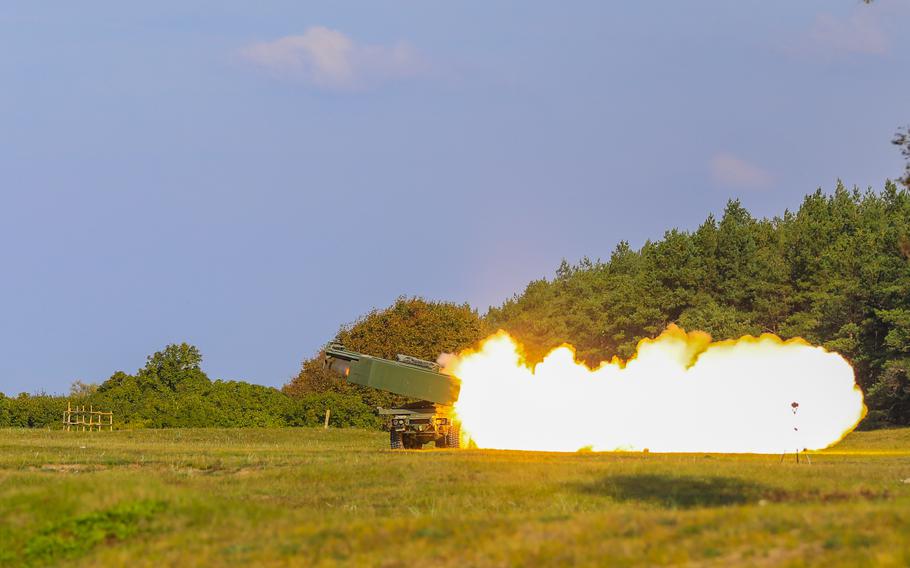
U.S. Army Soldiers fire a Reduced-Range Practice Rocket from an M142 High Mobility Artillery Rocket System during a Latvian-led field artillery live fire exercise, NAMEJS, at Liepaja, Latvia, Sept. 27, 2022. The HIMARS system is among the more billions of dollars in military support the U.S. provided to Ukraine since the beginning of its conflict with Russia in February 2022. (Lianne Hirano/U.S. Army)
Since Russia’s invasion of Ukraine in late February, the U.S. has provided Ukraine with $17 billion in military aid. This aid includes missile and radar systems, surveillance drones, military vehicles, military gear, and explosives equipment and training. The Department of Defense has already initiated the process to replenish our weapons, but this process could take several months, if not years, to complete.
To prevent further strain on our defense system and U.S.-Russian relations, the United States must terminate further military aid and weapons transfers to Ukraine. The U.S. cannot afford to give away any more weapons because it weakens U.S. defense capabilities. If conflict breaks out, the U.S. would not be adequately prepared to defend itself. Halting weapons transfers to Ukraine will allow the U.S. to focus on replenishing its arsenal before aiding other countries.
U.S. military support for Ukraine escalates tensions. Russia perceives such military support as an act of aggression and could retaliate in response. Therefore, the U.S. needs to withdraw its military support for Ukraine to prevent worsening relations with Russia.
Adopting a more neutral stance on the conflict will offer the United States a better standpoint from which to negotiate with Russia. Russia will be more inclined to engage in open dialogue if the U.S. maintains a neutral position. This will de-escalate tensions and provide an opportunity for the United States to engage as a mediator for conflict resolution.
The U.S. weapons stockpile is at a critical point. It cannot spare any more weapons for Ukraine. U.S. national security and defense are at stake. Washington must promote U.S. interests; Washington must prioritize re-building our military arsenal. The United States must be ready to rise and meet the challenge posed by China in the South China Sea. It cannot accomplish this without prepared military forces, so Washington must seek immediate action to reverse its depleted weapons stockpile.
The United States’ fanatical devotion to Ukraine’s war effort is undermining our own security interests. The U.S. is positioning itself directly in the military conflict against Russia by providing weapons to Ukraine. As history has shown by the rise of the Taliban from the U.S.-backed mujahideen in the Soviet-Afghan war, this cannot end well. Further antagonizing Moscow harms American security.
De-escalating the conflict requires U.S. willingness for engagement with Russia. This can only occur if Washington embraces a neutral stance on the conflict and a desire for peacemaking. Moscow will be more inclined to partake in dialogue if Washington demonstrates a willingness and flexibility to cooperate, as it has done previously in joint arms control efforts.
There are concerns about the impact on regional security if the U.S. terminates its military support for Ukraine. Yet Ukraine’s military success over the past seven months demonstrates its ability to defend itself against Russian aggression. The Ukrainian military is well equipped in terms of aid, resources and experience to fight in this war against Russia. Ukrainian soldiers have received extensive training from American soldiers prior to the invasion and they have proven their skills through successful military operations.
The U.S. must end its military aid to Ukraine and focus on rebuilding its stockpile to pre-invasion levels. The U.S. must maintain a neutral approach and engage in critical dialogue with Russia. Ukraine will continue to prevail in the face of Russian aggression, due to the support and training provided by the United States. America can rest. Through U.S. mediation efforts, there will be an end to war, and a return to peace.
Mackenzie Fries is a graduate student in an M.A. program for Security Policy Studies at The George Washington University.